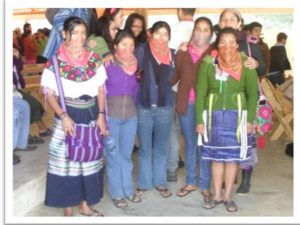Can you tell us about your story and what is feminism for you?

We began our formal work with young women in 2010. However, the majority of the colleagues that are participating now in Yocoyani were part of the IngacionMartín-Baró Brigade, which was born in Guadalajara City in the state of Jalisco. This brigade was born in January, 1999 at a call of the Ejército Zapatista de Liberación Nacional (EZLN) to carry out the National Consultation on Indigenous Law and Culture against the genocide war. Since the beginning, in the different activities that we undertook in the Brigade we put special interest in gender issues and in working with women as the majority of the participants were women between 20 and 30 years old. In Yocoyani we consider that as long as the sex-gender power system exists nor women nor men will be able to be free. Thus we started the project’s work with women with a feminist perspective. Yocoyani is composed by women and men university students and professionals committed with building and visibilizing egalitarian relationships between women and men. To us feminism is a social and political movement, a theory, it’s a new way of living, it’s a different way to relate between women and men, women and women, men and men. Feminism fights for dismantling the patriarchal system, that mode of domination of men over women which undermines them. As such, feminism allows us to visibilize women as historic agents/subjects and creators of actuality. Feminism strongly questions power structures and it’s a fundamental tool to fight against the neoliberal capitalist system. In Marcela Lagarde’s words, feminism characterizes itself by promoting“relationships where no one exercises sexual power or gendered over other/s” But above all, for us feminism represents the hope that is possible to build a world in which many other worlds have place.
What activities have you carried out with FRIDA’s support?
Nowadays, we are able to undertake two projects. The first focuses on participation with a group of women in a low-income neighborhood called “La Duraznera”, located in Tlaquepaque, in the city outskirts. The other project is the one that we do with the zapatistas’ women in the indigenous communities.
Why are these initiatives special?
These types of initiatives allowed us to, in a first moment, to establish a close relationship with vulnerable groups. This is both in Guadalajara’s metropolitan area as well as in the Municipality of Morelia in Chiapas.

What have been the main achievements and challenges within the project?
The achievements that we have accomplished with FRIDA’s resources are: 1) convene, organize and coordinate a traveling campaign / caravan with more than 40 youth people that started in Chiapas last summer to bring information and workshops to the zapatistas’ autonomous indigenous communities of Morelia; 2) we have related with different groups of vulnerable women and with other civil society organizations that allowed us establishing contacts and get information to grow and expand our impact; 3) we have strengthen a groups of women living in extreme poverty in the urban area near us that today is able to organize, fight and transform thanks to the accompaniment and capacity building process given by the youngest colleagues in our group.



